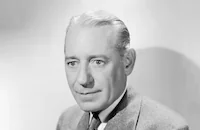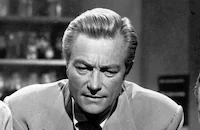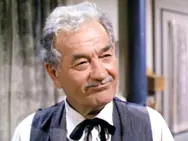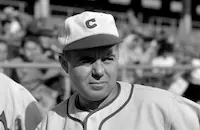No Man of Her Own

Brief Synopsis
Cast & Crew
Mitchell Leisen
Barbara Stanwyck
John Lund
Jane Cowl
Phyllis Thaxter
Lyle Bettger
Film Details
Technical Specs

Synopsis
In the small town of Caulfield, Helen Ferguson reflects on her loving marriage and comfortable home, which have been disrupted by a murder. When she learns that the police are on their way to her house, Helen prays that her sins will not be visited on her son, and recalls the events that brought her to this point: Years before, in New York, Helen's boyfriend, Stephen Morley, cruelly dumps her because she is pregnant. Although she is destitute and homeless, Morley refuses to see her when she comes to his apartment, and merely slips a train ticket for San Francisco under his door. On the train to San Francisco, Patrice Harkness, who is also pregnant, and her husband Hugh take pity on Helen and offer her one of their seats. Patrice and Helen become friendly, and Helen learns that Patrice is on her way to meet her in-laws, who are planning to help support her and Hugh during her pregnancy. While they are in the washroom, Patrice gives Helen her wedding ring to hold. Just then, the train crashes, and Helen is knocked unconscious, while Patrice is killed. After her baby boy is delivered by caesarian section in the hospital, Helen awakens and discovers that she has been mistaken for Patrice, whose ring she still wears. Although Helen tries to tell the doctor the truth, he believes that she has become hysterical because of the news of Hugh's death and sedates her. As Patrice had no family, and the Harkness family is now caring for her, Helen decides to maintain the pretense for the well-being of her baby. After her full recovery, Helen travels to Caulfield, where she moves in with Hugh's parents, and meets Hugh's brother Bill. Helen is tormented by her deception, but nevertheless allows her child to be baptized as Hugh and settles comfortably into the Harkness home. The Harknesses attribute Helen's lack of intimate knowledge about Hugh to the accident. Bill, however, becomes convinced that Helen is an impostor, but because he has fallen in love with her, he does not reveal his doubts. By Christmas, the Harknesses have changed their will to favor Helen and her son, although Helen vehemently asks them not to. Bill confesses his love to Helen, but she asks him for more time. One night at a country club dance, Helen is shocked to see Morley, who later demands money to keep quiet and threatens to take baby Hugh. Mrs. Harkness opens a bank account for Helen, and she uses the money to pay off Morley. Rather than leave town as he had promised, however, Morley then demands that Helen marry him, so that he will share her inheritance when the elderly Harknesses die. As the Harknesses dote on Helen, she buckles under the pressure. At the last minute, however, Helen refuses to proceed with the marriage, and Morley telephones the Harknesses. Mrs. Harkness, who has a weak heart, answers the phone and hears only Helen's voice in the background pleading with Morley. Helen reluctantly marries Morley, but Mrs. Harkness is alarmed and tells Bill about the mysterious phone call. When Helen gets home, she takes Mr. Harkness' gun and goes to Morley's office, intending to kill him. Although she finds that Morley is already dead, Helen fires a shot just to be sure. Bill, who has followed her there, believes that she has killed Morley, and helps her remove the evidence, then dumps Morley's body on top of a passing freight train. On the drive home, Bill admits that he always knew she was not the real Patrice, but is unswerving in his love for her, and Helen confesses she cares for him. When they get home, they find that Mrs. Harkness has died of a heart attack, and Helen blames herself. Three months later, Helen and Bill are married, and the Harkness family maid, Josie, brings Helen a note that she had been holding in the event of an emergency, in which Mrs. Harkness claims responsibility for Morley's murder. Although neither Bill nor Helen believe that she was the killer, Bill insists on giving the note to the police in order to clear his wife. When the police arrive, Helen admits the truth, but the police reveal that Morley's killer, his girl friend, was captured during a gambling raid and made a full confession. Bill and Helen are at last free of the shadow of guilt that oppressed them.

Director

Mitchell Leisen
Cast

Barbara Stanwyck

John Lund

Jane Cowl

Phyllis Thaxter

Lyle Bettger

Henry O'neill

Richard Denning

Carole Mathews
Harry Antrim
Catherine Craig
Esther Dale

Milburn Stone

Griff Barnett
Edna M. Holland
Georgia Backus
Jean Ruth

Dooley Wilson
Ivan Browning
William Haade
Jean Andren
Selmer Jackson
Laura Elliot
Charles Dayton
Dick Keene
Johnny Michaels
Virginia Brissac
Thomas Browne Henry
Willard Waterman
Mary Lawrence
Jack Reynolds
Sumner Getchell
Dave Willock
Helen Mowery

Kathleen Freeman
Emmett Smith
Gordon Nelson
Ashley Cowan
Jimmie Dundee
Phil Tully

Ray Walker
Esther Howard
Frank Marlowe
Gaylord Pendleton
Stan Johnson
Crew
Claire Behnke
Sally Benson
Haskell Boggs
Henry Bumstead
Dean Cole
Sam Comer
John Coonan
Earl Crowell
Frances Dawson
Hans Dreier
Farciot Edouart
Don English
Bob Ewing
Daniel L. Fapp
Hugo Friedhofer
Gene Garvin
Edith Head
Gordon Jennings
Mitchell Leisen
Alma Macrorie
Richard Maibaum
Don Mckay
Ray Moyer
Erwin Newmeyer
Catherine Turney
Wally Westmore

Film Details
Technical Specs

Articles
No Man of Her Own (1950) - Barbara Stanwyck in NO MAN OF HER OWN, Directed by Mitchell Leisen
Mitchell Leisen's No Man of Her Own (1950) is a prime example, a fiercely ambivalent and morally fraught noir that cross vectors with the "woman's film" melodrama with far more nerve and queasiness than any Joan Crawford film of the day. Leisen himself remains an underappreciated journeyman-auteur whose lengthy career is filled with genre films that mutate into stranger and more affecting things: Death Takes a Holiday (1934) is a romantic fantasy harboring a bitter pagan pessimism, Easy Living (1937) is a screwball with a salient capitalism critique at its center, Remember the Night (1940) is a Preston Sturges rom-com that turns the corner into disarmingly grown-up pathos, and so on. Leisen's Oscar-nominated hits, Hold Back the Dawn (1941) and To Each His Own (1946) are Olivia de Havilland melodramas remarkable for their oddness and sincerity. Leisen had his fair share of mediocrities, too, but No Man of Her Own is a restless freak, beginning with Barbara Stanwyck's portentous narration telling us that the perfect suburb she lives in is indeed perfect "but not for us," meaning her Thomas Wolfe-reading husband (John Lund) and dozing child, suggesting a Brief Encounter-style disrupted domesticity but then coming clean with, as she says on the soundtrack, "murder."
How exactly Stanwyck's weary Mom came to be haunted by more than one cold corpse is something of a crazy uber-noir story (adapted from a Cornell Woolrich novel), beginning, shockingly, with a 40-something Stanwyck pregnant, penniless, and sobbingly begging at the skid row apartment door of the despicable louse (Lyle Bettger) who knocked her up. Her name is different, too, but how exactly she has a new identity thrust upon her is merely the outrageous set-up; eventually, once Stanwyck embraces her new life amid the nouveau riche with her new bastard baby, Bettger comes crawling back into the picture, and blackmail spawns far nastier business.
Shades of Antonioni's The Passenger, adopting a dead person's identity is fraught with potential disaster, not to mention an existential dilemma that metaphorically reaches out to the very idea of marriage (particularly for a woman in the mid-century) as well as a good deal of postwar lostness and aimlessness. But Leisen's film has more classically James M. Cain-ish things on its mind. The twisted angst of the story is completely founded on a dread of losing newfound affluence and sanctuary - Stanwyck's very self-aware character walks on eggshells for the whole film, this close at all times to being disqualified from the American Dream. Leisen, as always, hones in on the emotionally ambivalent details. Lund, as the brother of the dead man the family thinks Stanwyck became pregnant by, is full of both suspicion and ardor from the beginning, but as he himself admits deep in, he doesn't care what Stanwyck's real name is, or who fathered her child. Stanwyck resonates in this tense situation, but never so much as when she, strong-armed by Bettger into a shotgun wedding service, decides silently to kill the bastard, and subtly smiles and tears up in the same instant.
Look at Lund, too, returning to the car after dumping the body, a complete future of haunted guilt soaking his features. Everyone is alive to the gravity of what's at stake - Bettger's the villain, but nothing he does compares to what's done to him. It's a heck of a narrative millstone to tie around the pearl-adorned throat of the film's romantic aspects, and that's the film's ace in the hole. Like so many films before it, but more acutely than, say, Otto Preminger's Fallen Angel or Michael Curtiz's Mildred Pierce (both from 1945), Leisen's semi-noir paints a deft portrait of suburban paradise, only to lift the carpets and examine the social stratum's bloody costs and repressed anxiety. Even during the finale, which typically pulls a few rabbits out of a hat and absolves Stanwyck from any technical culpability, the film is eloquently conflicted and tellingly guilt-ridden.
For more information about No Man of Her Own, visit Olive Films. To order No Man of Her Own, go to TCM Shopping.
by Michael Atkinson

No Man of Her Own (1950) - Barbara Stanwyck in NO MAN OF HER OWN, Directed by Mitchell Leisen
Quotes
Trivia
Notes
The working titles of this film were With This Ring, The Lie, They Call Me Patrice and I Married a Dead Man. Cornell Woolrich's story was originally titled "They Call Me Patrice" and was first published in Today's Woman magazine. He then published the story as a novel titled I Married a Dead Man under the pseudonym William Irish. In a modern interview, director Mitchell Leisen, stated that he wrote a screenplay based on the novel after turning down Sally Benson's initial screenplay. Leisen added that Catherine Turney wrote the opening of the film, and that he did not take screen credit because he was not a member of the Screen Writer's Guild. A script in the Paramount Collection at the AMPAS Library confirms that Leisen contributed to the screenplay, but does not indicate the extent of his contribution.
According to a New York Times news item, Barbara Stanwyck's character was originally written as a prostitute. Although information in the MPAA/PCA Collection at the AMPAS Library does not confirm this, the New York Times article noted that the PCA refused to approve the script because according to the Production Code, a character portrayed as a prostitute would have to pay for her "sin" by death, and Leisen was not "willing to accept such a tragic ending."
Information in the MPAA/PCA Collection reveals that the PCA rejected the initial script in May 1949, after determining that "it has a very definite flavor justifying murder as a means of getting rid of a blackmailer." The PCA added the following in their letter to Paramount: "Your sympathetic leads are guilty respectively of deliberate attempted murder, and of seriously interfering with the process of justice, which misdemeanors they successfully conceal from the police." The PCA suggested that the producers "introduc[e] an important stronger voice for morality" and that they "rewrite the end...so that Helen and Bill definitely confess to the police their illegal activities, and have the police indicate that they will have to stand ready to face the consequences." Actor Lyle Bettger made his feature film debut in this picture.
Woolrich's novel was the basis for two other films: I Married a Shadow, a 1982 French production, directed by Robin Davis and starring Nathalie Baye and Francis Huster; and the 1996 Tristar release Mrs. Winterbourne, directed by Richard Benjamin and starring Shirley MacLaine and Ricki Lake.














